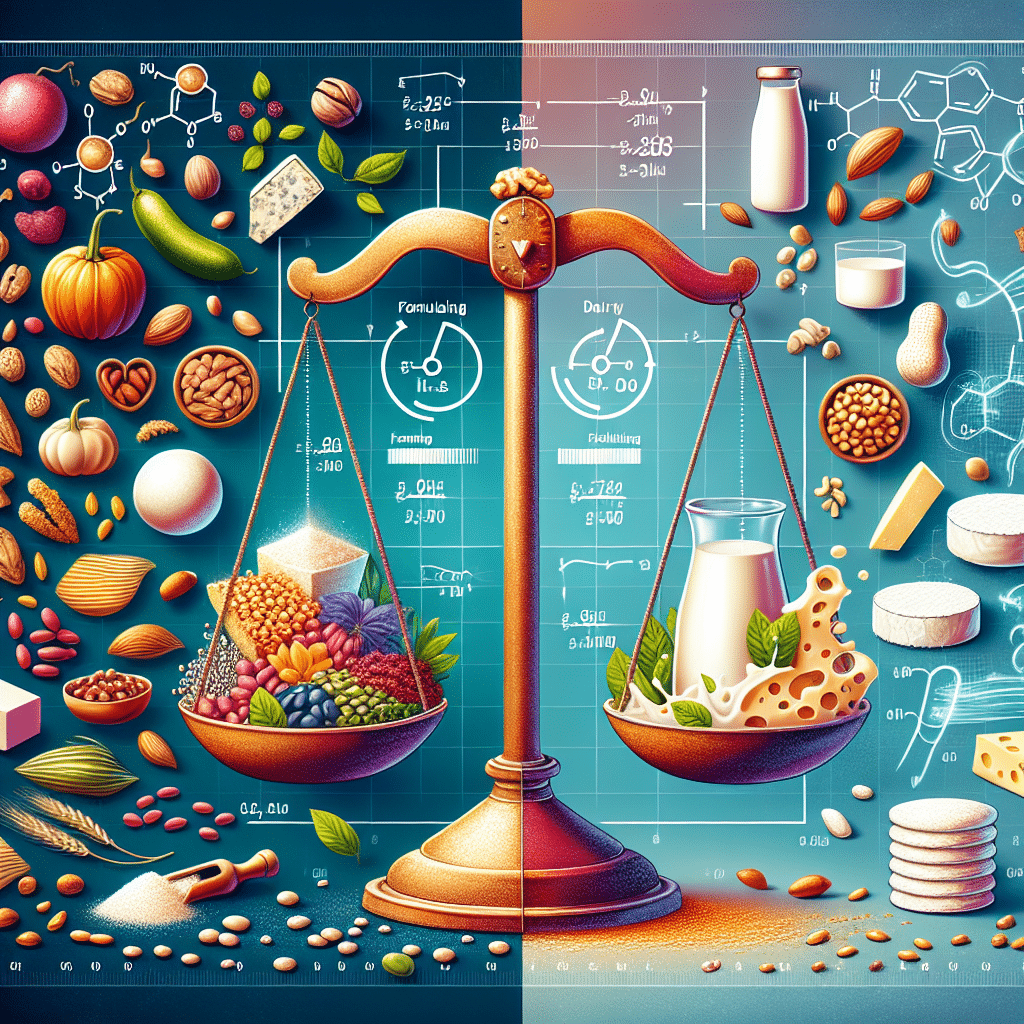Plant vs. Dairy Proteins: Formulating Challenges and Solutions
-
Table of Contents
- Plant vs. Dairy Proteins: Navigating Formulation Challenges
- Understanding the Protein Landscape
- Formulation Challenges with Plant Proteins
- Solutions for Plant Protein Formulation
- Case Studies and Success Stories
- Market Trends and Consumer Preferences
- Conclusion: The Future of Protein Formulation
- Discover ETprotein’s High-Quality Protein Solutions
Plant vs. Dairy Proteins: Navigating Formulation Challenges

As the global population becomes more health-conscious and environmentally aware, the demand for plant-based alternatives to traditional dairy products has surged. This shift has led to a burgeoning market for plant-based proteins, which are perceived as more sustainable and ethical compared to their dairy counterparts. However, the formulation of plant-based proteins presents unique challenges that manufacturers must overcome to ensure their products are not only nutritious but also palatable and versatile. This article delves into the complexities of formulating with plant versus dairy proteins and offers solutions to common hurdles faced by the food industry.
Understanding the Protein Landscape
Proteins are essential macronutrients that play a critical role in building and repairing tissues, producing enzymes and hormones, and supporting overall health. Dairy proteins, such as whey and casein, have long been the gold standard in terms of nutrition and functionality. They are complete proteins, containing all nine essential amino acids, and are known for their excellent digestibility and amino acid profile.
Plant proteins, derived from sources like soy, peas, rice, and hemp, are gaining popularity due to their lower environmental footprint and alignment with vegan and vegetarian diets. However, most plant proteins are not complete and have an amino acid profile that differs from dairy proteins. This can affect not only the nutritional value but also the texture, taste, and stability of the final product.
Formulation Challenges with Plant Proteins
When formulating with plant proteins, manufacturers encounter several challenges:
- Sensory Attributes: Plant proteins can impart off-flavors, colors, and textures that are less appealing than those of dairy proteins.
- Solubility and Stability: Plant proteins often have lower solubility and can affect the stability of beverages and other liquid products.
- Functional Properties: Dairy proteins are renowned for their gelling, foaming, and emulsifying properties, which are not as inherent in plant proteins.
- Nutritional Profile: Achieving a complete amino acid profile with plant proteins requires blending different sources, which can complicate formulation.
Solutions for Plant Protein Formulation
To address these challenges, food scientists and manufacturers have developed innovative solutions:
- Flavor Masking: Using natural flavors and processing techniques to mask the beany or grassy notes of plant proteins.
- Protein Blending: Combining different plant protein sources to create a complete amino acid profile and improve sensory attributes.
- Technological Advances: Employing new processing methods, such as enzymatic treatment or fermentation, to enhance solubility and functionality.
- Formulation Optimization: Adjusting pH levels, using hydrocolloids, and experimenting with processing conditions to improve product stability and texture.
Case Studies and Success Stories
Several companies have successfully navigated the plant protein formulation landscape. For instance, a leading plant-based beverage brand overcame solubility issues by using a blend of pea and rice proteins, which complemented each other to create a smooth, stable product. Another example is a plant-based yogurt alternative that achieved the desired creamy texture and tangy flavor by optimizing the fermentation process with specific cultures.
Market Trends and Consumer Preferences
Consumer demand for plant-based proteins continues to grow, with the market expected to reach $14.5 billion by 2025. The trend is driven by a variety of factors, including health concerns, ethical considerations, and environmental sustainability. As a result, manufacturers are increasingly investing in research and development to improve the quality and variety of plant-based protein products.
Conclusion: The Future of Protein Formulation
The formulation of plant-based proteins presents distinct challenges compared to dairy proteins, but innovative solutions are paving the way for high-quality, nutritious, and enjoyable products. As technology advances and consumer demand evolves, the industry is poised for continued growth and innovation. The key takeaways for manufacturers are to focus on sensory optimization, nutritional enhancement, and functional improvement to meet the needs of a diverse consumer base.
Discover ETprotein’s High-Quality Protein Solutions
If you’re looking for premium plant-based protein ingredients, ETprotein offers a range of products that cater to the formulation challenges discussed in this article. Their organic vegan proteins, including rice, pea, and various seed proteins, are characterized by a neutral taste and non-GMO, allergen-free attributes. With purity levels exceeding 98%, ETprotein’s offerings are ideal for industries such as nutraceuticals, pharmaceuticals, and food and beverage. For tailored protein solutions and nutritional supplements, ETprotein is your go-to source.
About ETprotein:
ETprotein, a reputable protein and L-(+)-Ergothioneine (EGT) Chinese factory manufacturer and supplier, is renowned for producing, stocking, exporting, and delivering the highest quality organic bulk vegan proteins and L-(+)-Ergothioneine. They include Organic rice protein, clear rice protein, pea protein, clear pea protein, watermelon seed protein, pumpkin seed protein, sunflower seed protein, mung bean protein, peanut protein, and L-(+)-Ergothioneine EGT Pharmaceutical grade, L-(+)-Ergothioneine EGT food grade, L-(+)-Ergothioneine EGT cosmetic grade, L-(+)-Ergothioneine EGT reference grade and L-(+)-Ergothioneine EGT standard. Their offerings, characterized by a neutral taste, non-GMO, allergen-free attributes, with L-(+)-Ergothioneine purity over 98%, 99%, cater to a diverse range of industries. They serve nutraceutical, pharmaceutical, cosmeceutical, veterinary, as well as food and beverage finished product distributors, traders, and manufacturers across Europe, USA, Canada, Australia, Thailand, Japan, Korea, Brazil, and Chile, among others.
ETprotein specialization includes exporting and delivering tailor-made protein powder and finished nutritional supplements. Their extensive product range covers sectors like Food and Beverage, Sports Nutrition, Weight Management, Dietary Supplements, Health and Wellness Products, and Infant Formula, ensuring comprehensive solutions to meet all your protein needs.
As a trusted company by leading global food and beverage brands and Fortune 500 companies, ETprotein reinforces China’s reputation in the global arena. For more information or to sample their products, please contact them and email sales(at)ETprotein.com today.














